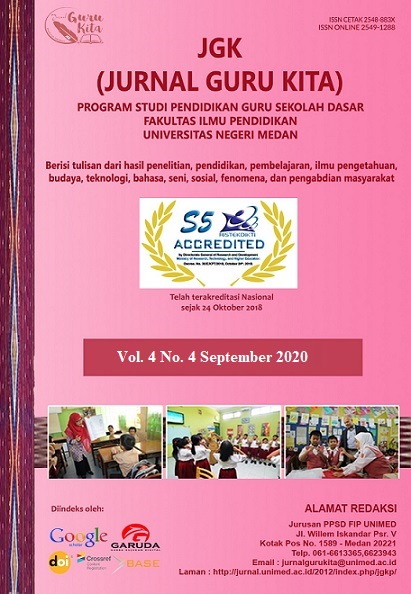PENGARUH METODE PEMBELAJARAN HOME VISIT DAN PEMBERIAN TUGAS TERHADAP HASIL BELAJAR MATEMATIKA DI KELAS VII SMP PADAMU NEGERI T.A 2020/2021
DOI:
https://doi.org/10.24114/jgk.v6i2.32941Keywords:
Hasil Belajar, Metode Home Visit, Metode Pemberian TugasAbstract
Abstract: The Effect of Home Visit Learning Methods and Giving Assignments on Mathematics Learning Outcomes in Class VII SMP Padamu Negeri 2020/2021. The purpose of this study was to determine the effect of student learning outcomes who received learning using the home visit method and learning with the assignment method on the eye. Mathematics lessons in class VII SMP Padamu Negeri in Medan city FY 2020/2021. This type of research is a quantitative descriptive research. The population used in this study were all students of class VII SMP Padamu Negeri totaling 60 students consisting of 2 classes. Sampling in this study was using a sampling technique, where the sample amounted to 60 divided into two groups, the experimental group I with a total of 30 students and the experimental group II with a total of 30 students. The tool used in data collection is a multiple choice test consisting of 20 questions to measure student learning outcomes. The data analysis technique in this study used normality, homogeneity, and hypothesis testing using the t-test formula. Based on data analysis, the average value of learning outcomes for the Home Visit learning method is 80.93 and the value of learning outcomes for the assignment-giving learning method is 74.68. From the results of the data analysis requirements test, the population is normally distributed and has a uniform variance (homogeneous) and the results of hypothesis testing show Ho is rejected and Ha is accepted with the results of tcount > ttable, namely 2.46 > 1.87. The researcher concluded that there was an effect using the Home Visit and Assignment learning methods on mathematics learning outcomes in Class VII SMP Padamu Negeri T.A 2020/2021. Keywords: Learning Outcomes, Home Visit Method, Assignment MethodReferences
Dimyati, dan Mudjiono. (2018). Belajar dan Pembelajaran. Jakarta: Rineka Cipta.
Djamarah, S. B. (2010). Guru Dan Anak Didik Dalam Interaksi Edukatif Suatu Pendekatan Teoritis Psikologis. Jakarta: Rineka Cipta.
Djamarah, S. B., dan Zain, A. (2010). Strategi Belajar Mengajar. Jakarta: Rineka Cipta.
Dongoran, J.& Bronika .S. (2021). Distance Learning Training with Google Classrom at SMAN 1 Sibabangun Regency Central. Jurnal Pengadian kepada Masyarakat. Reka Elkomika: Bandung.
Dwita, K. D., & dkk. (2018). Pengaruh Home Visit dan Motivasi Belajar Terhadap Hasil Belajar2,46 > 1,87 Siswa Di SD IT Harapan Bunda Purwokerto. Jurnal Ekonomi, Bisnis, dan Akuntansi (JEBA), Vol 20(01), 1-15.
Hamalik, O. (2016). Proses Belajar Mengajar. Jakarta: Bumi Aksara.
Mokodompit, I. S. (2020). Home Visit sebagai Refleksi Kurikulum Darurat Covid-19: Kesiapan Guru, Respon Siswa, Materi dan Hasil Belajar di Madrasah Tsanawiyah. DirÄsÄt: Jurnal Manajemen dan Pendidikan Islam, Vol 6(2), 119-131. 64
Nasution, W. N. (2017). Strategi Pembelajaran. Medan: Perdana Publishing.
Nirmala, B., dan Annuar, H. (2021). Home Visit: Strategi PAUD dari Rumah bagi Guru di Daerah 3T pada Masa Pandemi Covid-19. Jurnal Obsesi : Jurnal Pendidikan Anak Usia Dini, Vol 5(2), 1052-1062.
Poerwadarminta, W. (2016). Kamus Besar Bahasa Indonesia. Jakarta: Balai Pustaka.
Purwanto. (2014). Evaluasi Hasil Belajar. Yogyakarta: Pustaka Pelajar.
Rahmayanti, dkk. (2013). Penerapan Metode Pemberian Tugas untuk Meningkatkan Motivasi Belajar Siswa dalam Pembelajaran IPS Kelas IV SD Toriapes Kasimbar. Jurnal Kreatif Tadulako Online, Vol 1(3), 144-156.
Seruni, dan Hikmah, N. (2014). Pemberian Umpan Balik Dalam Meningkatkan Hasil Belajar Dan Minat Belajar Mahasiswa. Jurnal Formatif, Vol 4(3), 227-236.
Sudjana, N. (2017). Penilaian Hasil Proses Belajar Mengajar. Bandung: PT Remaja Rosdakarya.
Sugiyono. (2016). Metode Penelitian Kuantitatif, Kualitatif dan R & D. Bandung: Alfabeta.
Suhendri, H. (2013). Penerapan Model Pembelajaran Konstruktif berbasis Penemuan Terbimbing dalam Meningkatkan Hasil Belajar Matematika. Jurnal Formatif, Vol 3(3), 177-183.
Suhendro, E. (2020). Strategi Pembelajaran Pendidikan Anak Usia Dini di Masa Pandemi Covid-19. Jurnal Ilmiah Tumbuh Kembang Anak Usia Dini, Vol 5(3), 133-140.
Downloads
Published
How to Cite
Issue
Section
License
Authors published with the JGK (Jurnal Guru Kita) agree to the following terms:
- Authors retain copyright and grant the journal the right of first publication with the work simultaneously licensed under a Creative Commons Attribution License (CC BY-SA 4.0) that allows others to share the work with an acknowledgment of the work's authorship and initial publication in this journal.
- Authors are able to enter into separate, additional contractual arrangements for the non-exclusive distribution of the journal's published version of the work (e.g., post it to an institutional repository or publish it in a book), with an acknowledgment of its initial publication in this journal.
- Authors are permitted and encouraged to post their work online (e.g., in institutional repositories or on their website) prior to and during the submission process, as it can lead to productive exchanges, as well as earlier and greater citation of published work. (See The Effect of Open Access)




























